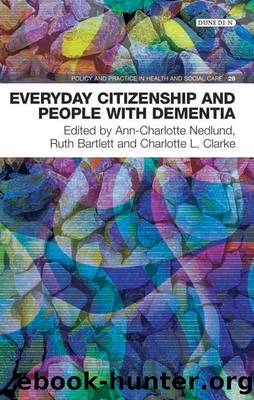Everyday Citizenship and People with Dementia by Ann-Charlotte Nedlund;Ruth Bartlett;Charlotte Clarke;

Author:Ann-Charlotte, Nedlund;Ruth, Bartlett;Charlotte, Clarke;
Language: eng
Format: epub
Publisher: Dunedin Academic Press
Published: 2019-08-15T00:00:00+00:00
Self and identity
All participants described feeling a sense of accomplishment after completing their art. As Daniel stated: â⦠it does make me feel good.â He also reflected:
Daniel: I was thinking that we should all be happy that weâre trying this together and we all are happy with what weâre accomplishing. So it just shows that we all can participate, but weâre coming out with some pretty fabulous things.
Hilary explained further:
Hilary: We all have so much talent. It just brings out in you that you do have some imagination and you can do certain things and nobodyâs going to say anything about it because everybody just puts their own into it and I think itâs fantastic.
Daniel stated: âI like to participate in this just to show that I can do some of it too, instead of looking inside and say â Iâll never be able to do that.â He later clarified:
Daniel: But it is like after you have made it, you say â see, this is what I did. It is not what you did. It is what I did. And that gives you your own private concentration. You know you can look at it and say, well, this is what I made and I appreciate these. This is what Iâve showed you. I can do it. Give me half a chance and I can do it.
Numerous participants described an increased sense of confidence:
Abigail: I guess I feel more confident in myself again â you know, to speak out. But thatâs what I feel I have gained.
Daniel: Weâre more confident in attempting something different.
Edward: Weâve gained more self-esteem.
Barbara noticed how her increased confidence helped her in community situations outside the art programme:
Barbara: I think the greatest help has been to be yourself with others and not be judged. You just feel comfortable as though you belong here and that you belong with people so that you can sort of take that to the community and be with people and still be yourself without being too self-conscious about your problems and hold everything back in. At least, I feel comfortable here and it helps when you are out in the community with a group to feel as though you can speak up a bit too without being judged too harshly.
Abigail responded to Barbara: âYou can just be yourself.â Hilary also described: âI can be myself here.â
Because of the relationships that were developed and being with others who had dementia, participants such as Abigail described the environment as comfortable:
Abigail: Itâs been a very comfortable, enjoyable time together. You donât feel as though youâre kind of restrained in what you might say, whether it comes out a different way than what youâre thinking and youâre just sort of yourself and enjoy each other.
Edward also disclosed that:
Edward: I think itâs just in a group like this you really are able to speak out because people are all the same. I think that we really know that we have support and I think that that makes a big thing.
Download
This site does not store any files on its server. We only index and link to content provided by other sites. Please contact the content providers to delete copyright contents if any and email us, we'll remove relevant links or contents immediately.
The Secret History by Donna Tartt(18157)
The Social Justice Warrior Handbook by Lisa De Pasquale(11951)
Thirteen Reasons Why by Jay Asher(8451)
This Is How You Lose Her by Junot Diaz(6434)
Weapons of Math Destruction by Cathy O'Neil(5828)
Zero to One by Peter Thiel(5488)
Beartown by Fredrik Backman(5350)
The Myth of the Strong Leader by Archie Brown(5237)
The Fire Next Time by James Baldwin(5016)
How Democracies Die by Steven Levitsky & Daniel Ziblatt(4951)
Promise Me, Dad by Joe Biden(4908)
Stone's Rules by Roger Stone(4854)
100 Deadly Skills by Clint Emerson(4688)
A Higher Loyalty: Truth, Lies, and Leadership by James Comey(4550)
Rise and Kill First by Ronen Bergman(4543)
Secrecy World by Jake Bernstein(4388)
The David Icke Guide to the Global Conspiracy (and how to end it) by David Icke(4377)
The Farm by Tom Rob Smith(4322)
The Doomsday Machine by Daniel Ellsberg(4243)
